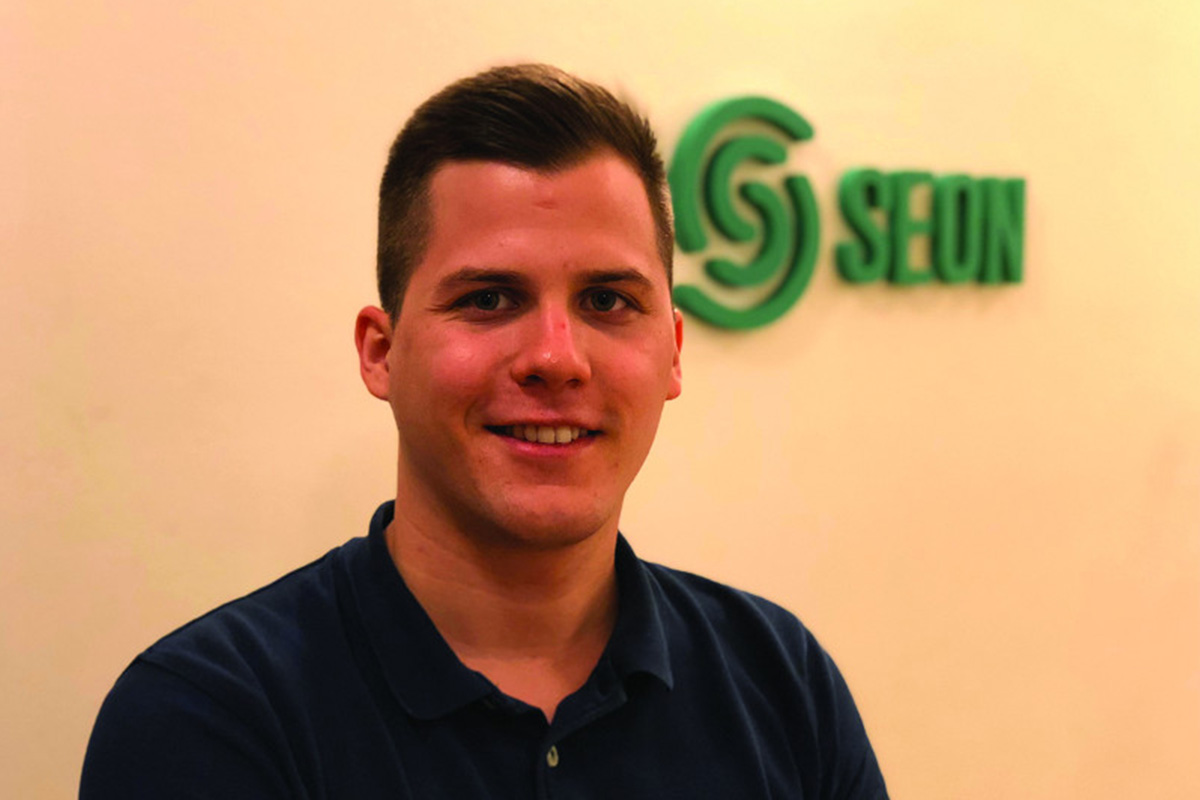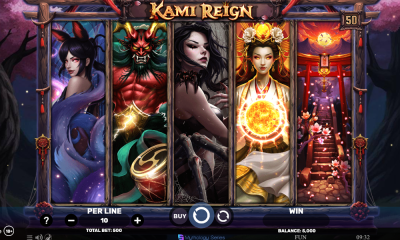Interviews
Exclusive Q and A with Tamas Kadar, Founder and CEO of SEON

“The sun literally never sets on SEON”, proudly declares Tamas Kadar while talking about the rapid growth of his company over the last few years.
There is more in this interview than such eye-catching slogans. He talks here about SEON’s origin, what exactly they do and how they do it. He concludes with insightful comments on fraud detection in the gambling industry and new developments.
Jump straight to the interview more such gems of quotes after the following appetizer about the tech start-up space:
“We have also been a profitable company since 2019, which is rarer than you’d think in the tech start-up space, where so many companies rely on rounds of investment rather than solid business fundamentals.”
Q. Let us start from the origin of SEON. Like Google, Facebook and many others, SEON too was founded at a university. While there is a brief intro about it on your website, could you narrate what exactly led to the founding of SEON?
A. Bence Jendruszák and I met at Corvinus University in Budapest and we instantly found that we had a shared interest in cryptocurrency. We saw that there was a gap in the market for a crypto exchange that served Central and Eastern Europe (CEE). When it went live, we were immediately bombarded by fraud attempts, but when we looked at what was currently on the market from legacy anti-fraud companies we found that nothing was really as good as what we knew was possible.
We created our own homebrew anti-fraud solution, and it was so good that other companies asked to use it. We saw that we had a business idea that had far more potential than the crypto exchange, re-focused our efforts, and now four years later here we are.
Q. Talk to us about the growth of the company over the years? Could you provide some statistics?
A. The most important stat is always going to be customer growth: we now have over 5,000 clients ranging from SMEs and start-ups to major international companies. We have also been a profitable company since 2019, which is rarer than you’d think in the tech start-up space, where so many companies rely on rounds of investment rather than solid business fundamentals. Most recently, we hired our hundredth employee, and we’re still growing.
Q. What are the recent developments and expansions? How did the company perform in a pandemic-induced world?
A. We’ve opened offices in four countries now: Budapest, London, the US and Indonesia – the sun literally never sets on SEON.
We also broke a record for the largest ever investment in a Hungarian company when we were funded by Creandum, who were also early investors in Spotify, Klarna and Depop. Their investment and mentorship are already allowing us to create new products and bring them to a much greater audience.
What’s more, we adapted well during the pandemic because we have always worked across multiple offices – changing to home working wasn’t a major challenge to us. The only difficulty was dealing with the sheer quantity of fraud during the past 18 months, but we have been able to continue to support our clients just as well as we had before the pandemic.
Q. SEON offers two products: Intelligence Tool and Sense Platform. Could you describe how SEON’s solution evolved into its present version?
A. The ideas were there from the start, but the technology behind them has gotten more sophisticated. We continually work on increasing speed to detect fraud even faster whilst reducing as much friction as possible for the end customer. At the same time, we build on depth for accuracy to reduce false positives. The more layering and data points we can check gives customers more certainty in each risk score. We also expand our breadth to cover more social signals and digital data points – an all-seeing eye to identify fraud quickly.
Q. How does SEON reduce friction for customers onboarding new users and accounts?
A. We know that customers want a fast, seamless sign-up process. If signing up for a new gaming site takes too long or requires too much work on the part of the player then they will go elsewhere. However, in gaming, as with other high-stakes industries like banking, there are regulatory demands that increase the ‘friction’ that new players are going to feel before they can start playing. It’s also very easy for anyone, whether they are a professional fraudster or just an unscrupulous player, to use throwaway emails, ‘burner’ phones and easy to obtain fake IDs and synthetic identities.
SEON can run a light and invisible customer profiling system in real time during customer signup that can assign risk scores to each customer – those with high scores will be given extra checks while the majority that are fine will go through with less friction. Since it is running in the background, customers will never know that they are being checked.
Q. What are the major types of fraud that SEON encounters and tackles? What sort of fraud do you think will affect the gaming and gambling industry in particular?
A. There are new forms of fraud emerging every day, so this list is going to be by no means extensive, but in iGaming we tend to see a larger number of low-stakes forms of fraud than in other industries. We find that because many gaming platforms give free bets or credit for new signups there is a lot of multi-accounting, which is fairly easy to find because there’s no incentive to create foolproof synthetic identities for a $10 bonus.
We also see a lot of ‘friendly’ fraud from players as opposed to criminals – players who have been banned creating new identities or unsuccessful players starting chargebacks to get back their losses. It’s a very fast-moving space compared to some of the other industries we work with, which is why it’s ideally suited for an AI-based system that can keep up.
Q. How does SEON ensure that it does not breach the user data protection and privacy regulations and protocols?
A. We always only use publicly available sources such as open data from social networks when we collect information—things like your browser, your screen resolution and hundreds of other device features.
We don’t store this information long-term in all cases – it is deleted after 12 months and not stored in a central database. We are fully compliant with GDPR and the relevant privacy regulations in the areas we operate. More importantly, we are always thinking about the balance between privacy and security in our work.
Q. Could you reveal the expansion plans and product launches in the near future?
A. We have just significantly upgraded our device fingerprinting capabilities based on our research on the kind of setups that fraudsters use to hide their tracks, and this will greatly increase our ability to not just detect fraud but prevent false positives and thereby increase the number of customers.
We also recently rolled out a revenue widget, designed to allow iGaming customers to easily see a snapshot of how much a user has deposited and withdrawn within the past year. Fraudsters usually have high revenue with low deposits as they abuse bonuses and loopholes.
Product updates and improvements are always ongoing as we develop more features that better support our customers and solve real fraud problems that they face.
To learn more about SEON, visit: https://seon.io/
Powered by WPeMatico
Black Cow Technology
Inside Black Cow’s Decision To Go All In On Multiplayer

Reading Time: 3 minutes
Black Cow Technology Founder and CEO, Max Francis, on why the company has shifted focus from software development to game development, and why he believes multiplayer is the future of online gambling entertainment
Black Cow has just announced its transition into a multiplayer content provider. What made you refocus the business in such a way?
We truly believe that multiplayer is the future of online gambling entertainment, and with our own technology capable of building next-gen multiplayer experiences, we wanted to transition into a content-led business and release some innovative games of our own. Our Multiplayer RGS is especially powerful, allowing operators and suppliers to bring multiplayer gameplay to any game format, even including non-gambling events. Black Cow’s robust, reliable and highly flexible technology is already used by some of the biggest organisations in the industry, including the likes of DraftKings and Light & Wonder. The shift into creating our own multiplayer content enables us to build on our successful Remote Game Server (RGS) and Jackpot Server technology to create first-of-its kind games offering unique player experiences via our Multiplayer RGS platform.
Tell us more about your Multiplayer RGS and its capabilities. What sets it apart from similar solutions in the market?
Our Multiplayer RGS has been several years in the making and is already live with Light & Wonder. Our Multiplayer RGS can be used to create multiplayer experiences across anything from slots and table games to crash, plinko, lottery, live dealer and bingo. Games can be player-cooperative or player versus player. The system’s capabilities are really only limited by the imagination of the people using it, and that’s why we’re so excited to be moving into the realm of game development so that we can push its limits to disrupt online casino lobbies with Black Cow content.
Taking a business in a new direction is a significant undertaking, not without its risks. How have you approached this transition?
It was clear to me that we had the technology to create multiplayer content, but not necessarily the experience to date, and that’s why we’ve been making strategic hires. This year we have promoted Paul Jefferson to the role of Chief Technical Officer and we have welcomed two more big-hitters to the business – Ernie Lafky as Chief Product Officer and Shelley Hannah as Chief Operations Officer. Ernie is taking the lead when it comes to what our games will look like and how we combine key elements like multiplayer, gamification and social interaction. Shelley is managing the operational aspects of our transition to a hosted product-first model. In terms of mitigating the risk, it comes down to the deep rooted confidence we have in our technology and our fantastic team, plus our belief that players are seeking social multiplayer entertainment.
Why do you have such a firm belief that multiplayer content is the future? And to what extent will it dominate online casino game lobbies?
It’s not the future, it’s the now. You just have to look at the experiences offered by other online entertainment options to see that they are becoming increasingly multiplayer and social. From dating to streaming, social media to mobile gaming, consumers want to engage with products and experiences that can be enjoyed with others. But online casino and sports betting sit at odds with this as they have been, and remain, mostly solitary experiences. We have started to see a bit of a shift away from this, first with live casino and then the rise of the crash game format. But this is just the start of what multiplayer online gambling entertainment can look like, and at Black Cow we have the vision, people and technology to really spearhead the multiplayer movement and be a true leader in the space.
As for the degree to which multiplayer content will dominate online casino and sportsbook lobbies, I think it has the potential to be significant but there will always be players that want to engage with more traditional games, products and experiences, so it will be down to each operator as to how they promote multiplayer games. Naturally, this approach will differ from brand to brand based on their specific player-base.
What can we expect from Black Cow now that your transition into a multiplayer game developer is well underway?
Paul, Ernie, Shelley and the team are working hard on our initial product roadmap, including the first run of games that will leave our production line. This is a really exciting moment for me and the whole team, as it will bring our vision to life and set the blueprint for what our multiplayer games will look like moving forward. It goes without saying that our multiplayer games will embody the core values we have built Black Cow on – reliability, flexibility and robustness. This is a big change for Black Cow, and change does bring challenges. But we are all aligned and excited by the new direction. Success is never guaranteed, but we are walking into the next chapter of the Black Cow story confident that it will be our best yet.
The post Inside Black Cow’s Decision To Go All In On Multiplayer appeared first on European Gaming Industry News.
Interviews
Scaling With Purpose: RedCore’s Tech Vision Explained

Reading Time: 7 minutes
At SiGMA Central Europe in Rome, European Gaming Media sat down with Yevhenii Yankovyi, Vice President of Technology and Deputy CTO at RedCore, for a deep look into what truly powers RedCore’s large-scale engineering operations.
RedCore is known for innovating at enterprise level, yet moving with the agility of a fast-growing tech company. In this conversation, Yevhenii breaks down how the organization manages that balance: how engineering teams maintain both speed and reliability, how automation empowers creativity, and why culture must remain a daily practice rather than a one-time achievement.
Can you introduce yourself and RedCore’s approach to engineering at scale?
Sure. My name is Yevhenii, I’m the Vice President of Technology at RedCore and Deputy CTO. RedCore is a large company with many products and projects, so everything we do operates at a significant scale. And when people hear “enterprise-level engineering,” the usual assumption is that scale automatically means slowness: slow decision-making, slow implementation, slow testing, slow time to market.
That’s the mindset we challenge. We don’t believe speed and stability are opposites. In our experience, at this level of complexity, the two actually reinforce each other. When you build the right processes, the right technical foundations, and the right organizational structure, speed becomes a natural result of stability – not something that contradicts it.
We plan for scaling from day one. For us, that’s a fundamental requirement. We build products with the expectation that they will grow, and growth means scale. So we design with that in mind from the very first line of architecture.
But that doesn’t mean disappearing for six or ten months to design the “perfect” system. That’s the common mistake people make when they hear “design for scale.” Our approach is different: we keep the long-term vision in mind, but we move fast, iterate, and make sure the product can evolve without slowing the team down. Stability and speed working together – that’s the engineering culture we build at RedCore.
How does RedCore balance speed and stability in daily engineering?
I will explain this with a simple metaphor: think about a car. Everyone talks about acceleration and top speed, but none of that matters if you can’t take a corner. Speed alone is not the winning formula – you also need control.
That’s exactly how we look at engineering at RedCore. We want to accelerate, make decisions quickly, and develop fast. But we also need the ability to slow down at the right moment, change direction, and stay agile. Balancing speed with stability is the only way to move at scale.
There are many layers to this – it’s a topic I could talk about for days – but in a nutshell:
at a big scale, you must have strong standards, clear policies, and a high level of automation. We rely heavily on automation: infrastructure as code, CI/CD pipelines, automated testing, and all the tools that remove repetitive, routine work from engineers’ daily lives. When the routine disappears, people can focus on what humans actually do best: creativity, problem-solving, and innovation.
However, automation doesn’t build the software for you. It creates a safety net. It catches mistakes, guards quality, and supports engineers when their creativity pushes boundaries. In other words: tools give freedom, and also protect that freedom.
And of course, this includes AI and many other modern tools. We use whatever helps us keep the balance: give people space to think, create, and experiment, while ensuring the system stays stable, predictable, and high-quality.
How does RedCore’s management keep teams aligned yet fast?
First of all, we provide clear goals. As I mentioned earlier, we always design for scale from day zero – but you can only do that if you know exactly what you’re building, for whom, and why. We have a very strong business team that understands the market and what needs to be delivered. The technology team works side by side with them, reinforcing them.
Once the goals are clear, we begin small. If you try to build a huge system from the beginning and get it wrong, you create a nightmare: something no one can support, change, or grow. Complexity grows exponentially, and humans don’t think exponentially; we think linearly. That’s where companies often get lost.
So we avoid that by validating early and validating often. We start with small steps, keep a close eye on every direction we take, and confirm that what we’re building is truly needed by the market. When we see that the direction is right, then we scale – and by that point, the foundation is already in place. It’s like preparing a launchpad so that when the time comes, the team can accelerate immediately.
We build block by block and work in iterations. We take a small team – one, two, maybe three people – and let them experiment for a week. We test the idea fast, get quick feedback, and bring it to the business side: “Do you like it?” If the answer is yes, then we continue, still following all the proper engineering practices before anything goes into production.
This constant loop between business and technology keeps everyone aligned. We give feedback, we receive feedback, and we move together. That’s how we stay both fast and coordinated, always ready to scale when the direction is confirmed.
How does automation empower engineers without slowing them down?
When we talk about automation, we’re really talking about optimization at scale. It doesn’t make sense to over-engineer small things, but at the scale we operate, the cost efficiency and speed gains are enormous. And people often assume that big systems and automation automatically slow everything down. For us, it’s the opposite.
The tools we introduce are not meant to tie engineers’ hands with bureaucracy. We don’t force strict guidelines or heavy processes that kill creativity. Our tools exist to help: to prevent mistakes, to collect feedback quickly, and to give teams the shortest possible path from idea to validation.
Here’s a simple example: we start experimenting with a small feature. We build a tiny prototype to see if the idea works. If it’s promising, the next step is testing, pipelines, deployment – all the things that normally take time. In many companies, engineers would try to do all of this manually because “building the tools will take too long.” But with us, the tools are already there. The infrastructure, the CI/CD, the automation – everything is ready to use. Our engineers are essentially customers of this internal platform that supports fast, safe delivery.
We have many different teams that have different great ideas. If one team tries something new and it works better, great – we learn from it. If another team has a different approach because of product specifics or release schedules, that’s fine too. We give freedom to the teams to work, share their experiences, and then scale.
Of course, there are non-negotiables. When it comes to security and data privacy there is zero tolerance. These are areas where strict rules are absolutely necessary. I always tell the security people: everyone should be a little afraid of you, because these things must be perfect. But outside those critical areas, we don’t impose rules that slow teams down. We experiment, gather feedback, adjust, and keep improving.
We’re constantly researching, experimenting, and customizing our automation depending on the product and the market. But when it comes to system design, we don’t reinvent the wheel. We choose globally recognized tools and industry-validated technologies. So yes, we empower engineers with automation and the right tools, built on a solid, modern foundation.
How does culture work for you – is it an achievement, or part of your routine?
Culture is a critical element in balancing speed and stability. Tools and processes matter, but culture is what truly empowers a team and keeps everything together at scale.
For us, culture starts with giving people freedom: the freedom to experiment, the freedom to make mistakes, and the freedom to challenge ideas. We don’t want engineers to be afraid of trying something new. We build a culture where mistakes are acceptable and manageable. If we try something and it doesn’t work, great – now we know better. We learn, adjust, and move on.
We encourage ideas from every level. Some of our most interesting insights come from developers who notice something while working on a small task. They can come directly to me or to the CTO and say, “I see a problem here.” It’s completely okay. A small detail in one corner of the system can become a huge issue at scale, so we listen. That’s how we avoid blind spots.
We also give teams autonomy. Small teams can make their own decisions and experiment in their own ways. If different teams want to do things differently, that’s fine – as long as they validate everything and share their findings. We want people to help each other and to understand that even top engineers have ups and downs. Even senior management makes mistakes. I constantly ask my team: “If I make a wrong decision, tell me.” It’s not about transparency as a buzzword – it’s about behavior. People observe how you respond, and they learn from that.
The biggest mistake any leader can make is demotivating people. We work with intelligent, educated, passionate professionals. They want to contribute. You just need to give them the space to do it. That’s when you see people shine and bring forward brilliant ideas.
As for the question of whether culture is an achievement or a routine – for us, it’s definitely a routine. People often talk about “building a strong engineering culture” as if it’s a success. We treat it as a routine as a process. Culture is the daily interactions between people in an organization. Those interactions change: people come and go, someone has a bad day, someone disagrees with a decision. Culture is shaped every day by how we communicate, how we argue, how we respect each other, and how we resolve differences.
Going to a colleague in the kitchen and asking, “Hey, what do you think about this?” – that’s culture. Anyone can talk to anyone, openly. And when engineers realize they can make a real impact, that they are heard, that they can influence the product — that motivates them. That’s what keeps the culture alive.
How do you balance standards with creative freedom?
The first thing is that we don’t pressure people. We set strict standards only where they are truly critical for the business. Security, data privacy, stability at scale – those areas demand clear rules. But everywhere else, we try not to push people. And when we do introduce a standard or guideline, we listen carefully to feedback. If the team tells us we made the wrong call, that’s okay – we rethink it and look for better approaches.
The second thing is that as the projects grow, the teams scale as well. Even in the design phase, we don’t start with a huge team. I prefer a small group: one key person who leads the design initiative, plus two or three contributors who constantly review, test, question, and give feedback. If three or four people align in one direction, that’s a good signal we’re on the right track. Then we take that proposal to a larger group – people who might use it or need it.. We refine it again based on their input. The idea evolves, but we don’t need to start from the beginning.
Finally, when we have a strong direction, we present it to the entire tech team. And even then – even if top management already supports the decision – it’s completely acceptable for a mid-level developer to raise concerns. Maybe they’ve seen something before, maybe they read an article, maybe they faced a similar issue. We listen, because at scale, one overlooked detail can cost millions.
So once again, balancing standards with creative freedom is about scaling the processes step by step: we start with a small group, validate in small cycles, and then scale the decision up gradually. This approach protects creativity, ensures high quality, and keeps us aligned. And combined with our culture, it makes the process both fast and safe.
The post Scaling With Purpose: RedCore’s Tech Vision Explained appeared first on European Gaming Industry News.
HIPTHER
How to Write a CV that Attracts Top Employers – Insights by Valeriia Virchenko, Head of Talent Acquisition at RedCore

Reading Time: 4 minutes
European Gaming Media joined RedCore and Valeriia Virchenko, Head of Talent Acquisition, at their SiGMA Central Europe booth in Rome to discuss a topic that resonates with every ambitious professional: how to write a CV that truly stands out to top employers.
As an accomplished recruitment leader with extensive experience across continents – from Europe to Latin America, Africa, and Asia – Valeriia brings a global perspective on what leading companies seek in candidates today. Under her leadership, RedCore’s talent acquisition strategy continues to attract and develop exceptional professionals across tech, marketing, and fintech.
Interview by Maria Emma Arnidou, HIPTHER – European Gaming Media
Valeriia, from your experience leading large-scale recruitment projects across international markets, what makes a CV truly stand out to top employers today?
First of all, thank you for the invitation. From my experience, what really makes a CV stand out is when candidates clearly show their results and impact. Top companies want evidence of what you achieved, not just a list of responsibilities. It’s important to include metrics or numbers – for example, not just “I managed a large team,” but “I led a team of 15 and increased results by 20%.” These details matter. Employers want to see how your experience directly helped solve problems or improved something within the company.

What are the most common mistakes candidates make when writing their CVs, and what advice would you give them to avoid these pitfalls?
This is a big topic, but in my opinion the most common mistake is that some CVs are simply too long. Hiring managers can only scan a CV briefly, so two pages, three at most, is enough. Writing a very long CV is a major mistake. Another point is simple but often overlooked: candidates really need to proofread their final draft. Small errors and little details matter because they show whether someone is attentive and pays attention to detail.
When reviewing applications at RedCore, what qualities or signals do you look for that show a candidate is ready to grow within a fast-paced, innovation-driven environment?
We mainly look for two things. The first is adaptability – people who can adjust quickly to change. The second is a genuine love of learning. We prefer hiring people with a growth mindset. How fast someone can learn new tools or approaches is very important for us, because our industry is extremely dynamic. If a person doesn’t like learning or isn’t open to new technologies, it becomes difficult to work together in such an environment.
On a CV, it helps a lot when candidates highlight this. If you started a new project, learned a new tool quickly, or solved a significant problem at work – mention it. These signals show us that you’re ready to grow with us.
RedCore is actively hiring specialists across various sectors – also C-level professionals. What can experienced candidates expect when joining your organization in terms of career growth and support?
We can talk about perks, benefits, high salaries – and of course we have all of that – but so does everyone. What I really want to highlight, especially for C-level candidates, is something different. If you look at our booth here at SiGMA Central Europe, you can see how big it is – because it houses the many brands : Mr. Booster, Frogo, PayPartners, and others. Each of these brands has its own C-level professionals, and these leaders grow inside our company.
What we offer C-level professionals is ownership and creative freedom: the opportunity to act like business owners. They can take a product from idea to market, understand what needs to be done, build the right sales strategy, and really drive the product forward. They get the freedom and responsibility of running a business, but in a comfortable environment and with minimal risk. You can focus purely on growth and vision.
And one more thing that’s very important for us: we always welcome C-level candidates to visit our booth at expos. We want to meet them, to get to know them, even if they are not actively looking for a new role right now. There are always opportunities, and we are always open to talent.

Finally, for those aspiring to join global companies like RedCore, what’s your number one piece of advice for crafting a CV that stands out and secures an interview?
Be very clear about your sector. If you work in fintech, iGaming, healthcare – mention it right away, because it immediately gives us an understanding of your background. These industries are not the same, and this context matters. The same goes for technical roles: if you’re a developer, list your full tech stack clearly. Which technologies, which tools – everything should be easy to find.
Structure and presentation are also important. It’s better to build your CV using a proper layout tool like Canva or Tilda, rather than leaving it as a plain Google Doc. Think of it like a user journey: recruiters and hiring managers should instantly know where to find the right information about you.
And finally, include a photo: a simple, professional portrait. Sometimes we see funny photos, and that’s not the impression you want to give when applying to a global company. You don’t need a studio shoot; even a phone photo taken against a white or grey wall is enough. People want to see who they might be working with in the future.
Thank you, Valeriia, for sharing your valuable insights on building a career-ready CV and giving us a closer look into RedCore’s approach to talent and professional growth.
RedCore is hiring – View the job openings & build your dream career with them!
Stay tuned for more exclusive interviews from SiGMA Central Europe 2025, brought to you by European Gaming Media, your trusted source for insights at the intersection of iGaming, tech, and innovation.
The post How to Write a CV that Attracts Top Employers – Insights by Valeriia Virchenko, Head of Talent Acquisition at RedCore appeared first on European Gaming Industry News.
-

 Hold and4 days ago
Hold and4 days agoPragmatic Play Rings in 2026 with Joker’s Jewels Hold & Spin™
-

 iGaming News 20264 days ago
iGaming News 20264 days agoSpinomenal Rings in 2026 with Japanese-Inspired “Kami Reign Ultra Mode”
-

 Five Elements Slot4 days ago
Five Elements Slot4 days agoPG Soft Concludes 2025 with High-Volatility Launch: Mythical Guardians
-

 Aztec Slot3 days ago
Aztec Slot3 days agoEvoplay Unveils Sunstone Riches: An Aztec Adventure Powered by the Sun
-

 Latest News4 days ago
Latest News4 days agoFrom ‘Mummyverse’ to Crash Games: Belatra Reviews a Landmark 2025
-

 Bespoke Gaming Studio4 days ago
Bespoke Gaming Studio4 days agoCreedRoomz and Casumo Forge Strategic Partnership to Elevate Live Casino Experience
-

 Akshat Rathee3 days ago
Akshat Rathee3 days agoIndian Esports 2026: Strategic Growth and the Asian Games Milestone
-

 Brazil Betting Law3 days ago
Brazil Betting Law3 days ago2026 iGaming Regulatory Roadmap: Key Compliance Deadlines

















